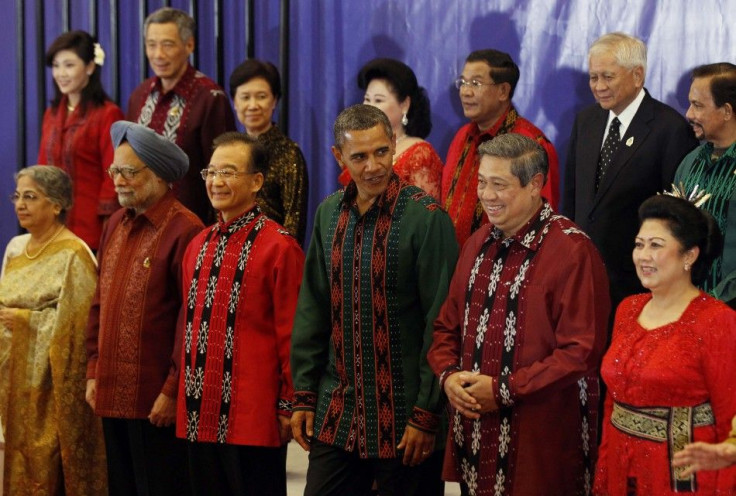U.S., China Air Differences in the Dispute over the South China Sea

The United States and China faced off on Saturday over the thorny issue of how to resolve competing claims by Asian countries to sovereignty of the South China Sea, the latest point of friction between the two powers.
President Barack Obama told Chinese Premier Wen Jiabao, who indirectly warned Washington on Friday to stay out of the dispute, that the United States wanted to ensure the sea lanes were kept open and peaceful.
Tensions flared earlier this year with often tense maritime stand-offs between claimants, including China, to a sea that carries some $5 trillion a year in world trade. An Australian think tank warned in June the tensions could spark a conflict that could draw in the United States and other powers.
The two leaders met on the resort island of Bali, Indonesia, on the sidelines of the East Asia Summit, a gathering of 18 countries with diverse political and cultural backgrounds that seeks to boost political and security cooperation.
Vietnam, Taiwan, the Philippines, Malaysia, and Brunei all have claims to parts of the South China Sea, while China claims large parts of the region, which might hold rich deposits of oil and gas.
The Southeast Asian countries, along with the United States and Japan, are pressuring Beijing to try to seek some way forward on the knotty issue of sovereignty, prompting Wen on Friday to warn outside forces to stop interfering, a veiled reference to Washington and Tokyo.
The impasse is largely over how any talks should be conducted.
China wants to hold bilateral talks with other countries that claim parts of the South China Sea as their territory, but the Southeast Asian claimants, the United States, and Japan are pushing for a multilateral approach.
It ought to be resolved through friendly consultations and discussions by countries directly involved. Outside forces should not, under any pretext, get involved, Wen told a meeting with Southeast Asian leaders on Friday, several of whose countries claim sovereignty to parts of the South China Sea.
Wen's comments were carried on the Chinese Foreign Ministry's Web site.
U.S. Secretary of State Hillary Clinton this week urged claimants to the South China Sea not to resort to intimidation to back their claims, itself an indirect reference to China.
Obama has been lower-key than Clinton as far as public comments are concerned. But he told the leaders of the Philippines, Malaysia, Indonesia, and India in bilateral meetings in Bali that maritime issues should be discussed at the summit.
The White House said that Obama and Wen also discussed long-festering economic issues, such as China's currency policy. U.S. lawmakers have long argued Beijing keeps the value of the yuan down to help drive the country's exports engine, a stance they say that costs American jobs.
It was a good engagement, said Tom Donilon, Obama's top national-security adviser.
Influence
The exchanges between the United States and China over the South China Sea are the latest barbs between the two countries as Obama sought in recent weeks to reassert a U.S. presence in the Asia-Pacific region to counter the growing clout of the world's second-largest economy, China.
Obama said in Australia on Thursday, during his last stop before jetting to the Asia meetings in neighboring Indonesia, that the U.S. military would expand its Asia-Pacific role, declaring America was here to stay as a Pacific power.
Days earlier, as host of the Asia-Pacific Economic Cooperation forum in Hawaii, Obama had voiced growing frustration at China's trade practices. He declared enough is enough as he pushed for a new Asia-Pacific trade deal with some of Beijing's neighbors.
The moves are seen as an attempt to reassert U.S. leadership in the face of China's rising influence around the Pacific Rim and to reassure allies such as South Korea and Japan that it would remain a strong counterweight.
Obama also announced on Friday that he would send Secretary of State Clinton next month to Myanmar, which has drawn closer to China in reaction to Western sanctions, the first such trip to the isolated country in half a century.
That will add to some fears in Beijing of encirclement in the Asia Pacific as the United States increases its footprint in the region.
Claims
China's claims over the South China Sea is by far the largest, forming a U-shape over most of the sea's 648,000 square miles (1.7 million square kilometers), including the Spratly and Paracel archipelagos.
The United States has irked China by declaring a national interest at stake in the South China Sea by ensuring the freedom of navigation and trade.
Estimates of proven and undiscovered oil reserves in the South China Sea range from 28 billion barrels of oil to as high as 213 billion barrels, U.S. figures showed in 2008. Gas deposits could be as high as 3.8 trillion cubic meters.
Both could supply China with energy for decades.
The Philippines has called for greater unity among Southeast Asian nations with claims in their stand against China. A strong position from the United States in support of open talks could embolden such unity.
(Writing by Neil Fullick, Editing by Jonathan Thatcher)
© Copyright Thomson Reuters 2024. All rights reserved.






















